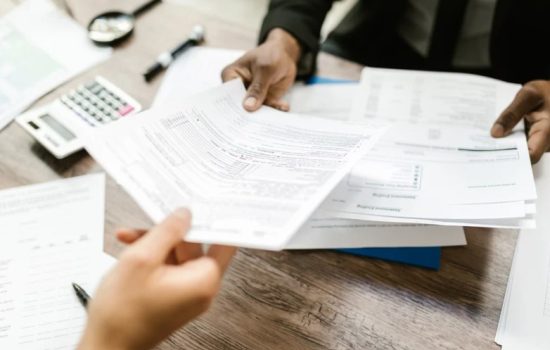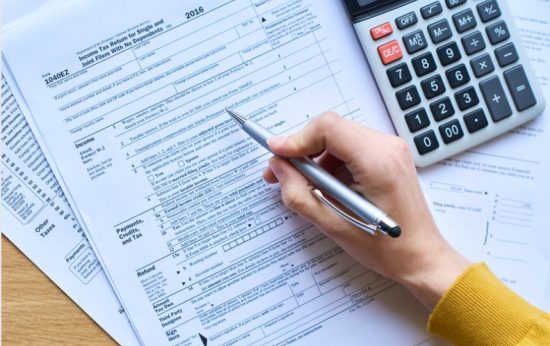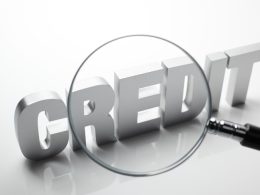Are you a taxpayer looking to navigate the labyrinth of financial jargon? Well, look no further! In this blog post, we’re going to shed some light on an important document that every taxpayer should be familiar with – the Notice of Assessment. Whether you’ve just filed your taxes or are planning for next year, understanding what a Notice of Assessment is and how it can benefit you is crucial. So let’s dive in and demystify this essential piece of paperwork!
What is Notice of Assessment?

A Notice of Assessment (NOA) is a document sent by the tax authorities to individuals or businesses after they have filed their tax returns. It serves as an official confirmation that your return has been processed and indicates whether any changes were made to the information you provided.
Think of it as a report card for your taxes. The NOA provides valuable details about your income, deductions, credits, and taxes owed or refunded. It outlines how much income you reported, which deductions and credits you claimed, and calculates the total amount of tax payable or refundable based on these factors.
Receiving a Notice of Assessment can be nerve-wracking for some taxpayers who fear audit triggers or unexpected adjustments. However, in most cases, it simply reflects the outcome of processing your return according to the relevant tax laws and regulations.
While every country may have its version of this document with slight variations in format and terminology, its purpose remains consistent – to inform taxpayers about their financial standing concerning taxes. Understanding what’s included in a Notice of Assessment is key to effectively managing your finances.
How to Get a Notice of Assessment?
Once you have filed your tax return, the government will assess it and send you a Notice of Assessment. Let’s dive into the process in more detail.
- Make sure that you have completed and submitted your tax return accurately and on time. This is crucial as any errors or delays may affect when you receive your Notice of Assessment.
- Once the government has processed your tax return, they will review it thoroughly to determine if everything is in order. They will calculate your income, deductions, credits, and taxes owed based on the information provided.
- After this assessment is complete, they will generate a personalized Notice of Assessment for you. You can expect to receive it either electronically or by mail, depending on how you file your tax refund.
- When receiving this document, ensure that all the information matches what was reported on your tax return. Check for accuracy regarding personal details such as name and address as well as financial figures like income and taxes owed.
- A Notice of Assessment is an essential document that provides important information about your tax situation. Understanding its contents can help you plan financially for the future or address any discrepancies with the government if necessary.
- Now that we’ve covered how to get a Notice of Assessment let’s explore what exactly is included in this crucial document!
What’s Included in a Notice of Assessment?

A Notice of Assessment is an important document that provides detailed information about your tax return. It includes a variety of items that are essential to understanding your tax situation.
- First and foremost, the Notice of Assessment will show the amount of income you reported and any deductions or credits you claimed. This is crucial because it determines whether you owe taxes or are entitled to a refund.
- Additionally, the document will outline any adjustments made by the tax authorities to your return. These adjustments could be due to errors or discrepancies found during their review process. It’s essential to review these changes to ensure accuracy carefully.
- The Notice of Assessment also includes information on any penalties or interest charges applied to your tax liability. This section will detail the consequences if you have failed to meet certain requirements or deadlines.
- Furthermore, this document may include information about carry-forward amounts from previous years, such as unused credits or losses that can be applied in future returns.
- A Notice of Assessment is invaluable for understanding your tax situation and ensuring compliance with government regulations. Take the time to review it thoroughly and seek professional advice if needed
How to Use a Notice of Assessment?
Once you have received your Notice of Assessment, it’s important to understand how to make the most out of this document. Here are some tips on how to effectively use your Notice of Assessment:
- Review the information: Take the time to read through all the details provided in your notice carefully. This includes verifying your personal information, such as your name and address, as well as ensuring that any deductions or tax credits you claim are accurately reflected.
- Understand your tax obligations: The Notice of Assessment will outline any taxes owed or refunds due based on the information submitted in your tax return. It is essential to comprehend these obligations and take appropriate actions accordingly.
- Keep it for future reference: While it may be tempting to discard this document once you’ve gone through it, keeping a copy for future reference is advisable. Having access to past Notices of Assessment can be helpful when applying for loans or mortgages, proving income history, or resolving any potential disputes with tax authorities.
- Make adjustments if necessary: If you believe there are errors in your assessment or discrepancies between what was filed and what was assessed, contact the relevant tax authority promptly. They will guide you through the process of making corrections or addressing any concerns.
- Use resources available: If you need further clarification about certain aspects mentioned in your Notice of Assessment, consult online resources provided by government agencies like Canada Revenue Agency (CRA) website. These resources can provide additional guidance on understanding specific terms and concepts related to taxation.
By following these steps, you can effectively utilize your Notice of Assessment and ensure that everything is accurate while also staying informed about your financial situation concerning taxes.
Tips for Understanding Your Notice of Assessment

Understanding your Notice of Assessment can be a bit overwhelming, but with a few helpful tips, you’ll be able to navigate through it like a pro.
Here are some key pointers to help you make sense of this important document:
- Take the time to read it thoroughly: Don’t just glance at your Notice of Assessment and set it aside. Take the time to go through each section carefully. This will ensure that you don’t miss any critical information or potential errors.
- Familiarize yourself with the terminology: The Notice of Assessment is filled with tax jargon and technical terms that may not be familiar to everyone. Take the extra step to understand what each term means so that you can fully comprehend the details outlined in your assessment.
- Compare it with previous assessments: If you’ve received a Notice of Assessment in previous years, compare them side by side. Look for any significant changes or discrepancies that may require further investigation or clarification from relevant authorities.
- Seek professional advice if needed: If you’re unsure about certain aspects of your assessment or have questions regarding specific deductions or credits, consider seeking advice from a qualified tax professional who can provide guidance based on their expertise and experience.
- Keep copies for future reference: It’s crucial to keep copies of all Notices of Assessment for future reference and record-keeping purposes, especially when filing taxes in subsequent years. These documents serve as proof of income reported and taxes paid during a particular period.
By following these tips, you’ll better understand your Notice of Assessment and enhance your financial literacy when it comes to taxation matters.
Conclusion
Filing your taxes in a timely and accurate manner will ensure that you receive a correct Notice of Assessment from the tax authority. It’s essential to review it carefully and take note of any discrepancies or errors. Don’t hesitate to contact the tax authority if you have concerns about your assessment. This document is an official record of your income and deductions for a specific taxation year, so make sure to keep track of it for future evidence if necessary.
Therefore, when you get one, thoroughly review it and ensure everything matches what was reported on your tax return. With this information, you’ll be better prepared to manage any financial difficulties that arise.
FAQs – What is Notice of Assessment
1. Is notice of assessment same as T4?
When your taxes are submitted, you will receive a notice of assessment. You’ll need a T4 from your employer and documentation of Employment Insurance payments, RRSPs, and any other income you earned throughout the year to submit your taxes.
2. Where do I find my notice of assessment Canada?
You can have a copy mailed to you by phoning the Canada Revenue Agency (CRA) at 1-800-959-8281 for your Notice of Assessment or 1-800-267-6999 for your Proof of Income Statement. When you call, you will be asked to verify your identification.
3. Do you always receive a notice of assessment?
When the CRA (or Revenu Québec) has finished reviewing your return, regardless of whether you filed your taxes online yourself or had a Tax Expert do them at H&R Block, you will always receive an NOA.
4. What is the maximum tax refund you can get in Canada?
In Canada, there is no such thing as a “maximum” tax refund. Your income, deductions determine your refund, and the amount of taxes paid.










